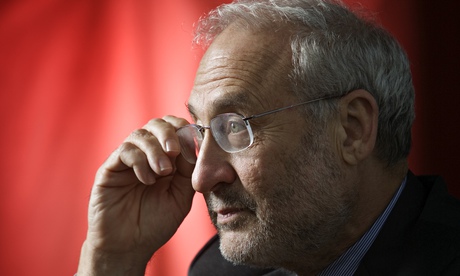Find the original posting on Guardian website here.
Find the IMF discussion paper 'Redistribution, Inequality and Growth' here
IMF study finds inequality is damaging to economic growth
International Monetary Fund paper dismisses rightwing argument that redistributing incomes is self-defeating

The IMF research backs Nobel-winning economist Joseph Stiglitz’s view that inequality is a drag on growth. Photograph: Murdo Macleod
The International Monetary Fund has backed economists who argue that inequality is a drag on growth in a discussion paper that has also dismissed rightwing theories that efforts to redistribute incomes are self-defeating.
The Washington-based organisation, which advises governments on sustainable growth, said countries with high levels of inequality suffered lower growth than nations that distributed incomes more evenly.
Backing analysis by the Keynesian economist and Nobel prizewinner Joseph Stiglitz, it warned that inequality can also make growth more volatile and create the unstable conditions for a sudden slowdown in GDP growth.
And in what is likely to be viewed as its most controversial conclusion, the IMF said analysis of various efforts to redistribute incomes showed they had a neutral effect on GDP growth. This last point is expected to dismay rightwing politicians who argue that overcoming inequality robs the rich of incentives to invest and the poor of incentives to work and is counter-productive.
The paper, written by Jonathan Ostry, the deputy head of the IMF's research department, and the economists Andrew Berg and Charalambos Tsangarides, comes after several years of heated debate over the path that developed and developing countries' economies have taken since the financial crash and whether their recoveries are sustainable.
Anti-poverty charity Oxfam welcomed the report, saying it shows "extreme inequality is damaging not only because it is morally unacceptable, but it's bad economics".
It added: "The IMF has debunked the old myth that redistribution is bad for growth and demolished the case for austerity. That redistribution efforts -essential to fight inequality- are good for growth is a welcome finding. Low tax and low public spending are clearly not the route to prosperity."
It is 18 months since the IMF published its controversial view that government cuts to public-sector spending were having a larger detrimental effect than previously thought. The paper, written by its chief economist, Olivier Blanchard, was incendiary and sparked denials in London and Brussels where calls for austerity were strongest.
Heated debate over Blanchard's analysis has continued ever since, with many economists claiming that assumptions used in the critique were flawed.
The authors of this latest report can expect the same backlash, especially in the US where the Tea Party has defended tax cuts for wealthy individuals and studies show most of the country's income growth since the crash has gone to the richest 1%.
Last year the UK's coalition government cut tax on incomes over £150,000 from 50p to 45p after a debate over the negative effects on growth of high taxes on wealthy individuals.
The French president, François Hollande, has come under severe criticism for raising the tax on incomes above €1m to 75% from business groups that claim it will hit GDP and discourage wealthy investors from staying in France.
The report's authors said the study, which excluded so-called market interference such as banker bonus caps and increases in welfare spending, showed the largest redistributions of income had negative effects on growth, but were offset by the benefits of lower inequality.
"We find that higher inequality seems to lower growth. Redistribution, in contrast, has a tiny and statistically insignificant (slightly negative) effect."
They said the traditional view that efforts to redistribute incomes would have a corresponding and most likely detrimental effect on growth was unfounded.
"Rather than a trade-off, the average result across the sample is a win-win situation, in which redistribution has an overall pro-growth effect, counting both potential negative direct effects and positive effects of the resulting lower inequality," they said.
In an interview later Ostry said it was his belief that the inclusion of higher welfare payments would only support the argument in favour of redistribution.